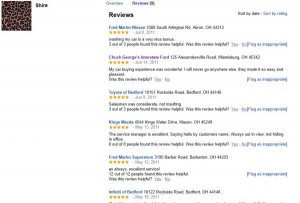- Jun 21, 2011
- 1
- 2
- First Name
- Matt
Interesting discussion. Matt Muilenburg here, new poster.
From the enthusiasm of this discussion alone, I think we can all agree that when it comes to emerging digital marketing techniques, reputation management is the hottest date in town. And as with all new offers, it’s pretty much a land grab right now. Dealers are understandably eager to capture their share of “reputation capital” and the surrounding ethics and legal implications are so new, no one is paying too much attention to the fine print just yet. Unfortunately, like all new digital marketing mediums, the “race for stars” is paved in red tape, and the implications of ignoring review regulations are increasingly serious. Although The Federal Trade Commission is only just beginning to crack down on bogus reviews, we can already see from the landmark Legacy Learning ruling that review regulation is going to be serious business. Upholding your reputation is just not worth a $250,000 fine (unless you’re Howard Stern .
.
So, in the spirit of education, here are some tips for vetting a potential reputation management vendor, from someone who is (full disclosure) Vice President of Reputation Management at ADP Digital Marketing. Employing these tactics can help you avoid a company who specializes in Joe's "star spam." (@joepistell-love that term, btw).
A few things to ask to vet a potential vendor:
1. “How do you gather reviews?” For example, our process is to send surveys to known customers who are validated out of the DMS. Pretty common-sense, and makes sense to anyone whether they know anything about reputation management or not. If a vendor tries give you some “magic beans” type answer about how the review collection process is “very complicated” and “secret sauce,” run.
2. “Can you guarantee all 5-star reviews?” This is a trick question, and our answer (and any honest vendor’s answer) is going to be “Heck no!” Our research shows that 85% of reviews are generally positive, so that’s what we aim for, but of course it really depends on your individual store and the level of customer service you offer, etc. Anyone that says they can offer you a perfect five-star reputation is up to something shady, so keep running.
3. “How soon/often can I expect new reviews?” A responsible reputation management vendor knows that genuine reviews follow the natural sales cycle. Reviews ebb in naturally, with maybe a little spike during sales or high seasons. If a vendor tells you that by hiring them you will have “200 glowing reviews by tomorrow” run as fast as your legs will carry you. All decent review sites monitor against exactly this kind of “popcorn approach” to reputation management, so if there is a big burst of review activity after a long period of nothingness, or directly after account creation, there’s a chance you could get banned from that review site permanently. Run, run, run, run.
My final piece of advice is this:
I hate to see dealers wringing their hands over a few bad reviews. There is such a cut-throat attitude in the dealership world toward reputation management, but a perfect 5-star review record was never the intention, nor should dealers so desperately pursue such an impossible ideal. I can see this is a controversial issue, but we agree with @glennjimerson on this one (although @kevinfrye and @eleyduke, I'd love to know your secret .
.
Our thought however is that, though you may expect your business to be perfect, your customers don’t. Customers who read online reviews are generally shrewd individuals, so if they see a perfect track record of five star reviews, this will likely raise their suspicions. The reality is, no business is perfect and consumers know this. They don’t need to find a dealership that’s perfect for everyone; they need to find the dealership that’s perfect for them. So don’t treat reputation management as a chance to madly bury your bad reviews. Instead, embrace the negative as a way to represent the uniqueness among stores. Trust me, it’s a good thing.
From the enthusiasm of this discussion alone, I think we can all agree that when it comes to emerging digital marketing techniques, reputation management is the hottest date in town. And as with all new offers, it’s pretty much a land grab right now. Dealers are understandably eager to capture their share of “reputation capital” and the surrounding ethics and legal implications are so new, no one is paying too much attention to the fine print just yet. Unfortunately, like all new digital marketing mediums, the “race for stars” is paved in red tape, and the implications of ignoring review regulations are increasingly serious. Although The Federal Trade Commission is only just beginning to crack down on bogus reviews, we can already see from the landmark Legacy Learning ruling that review regulation is going to be serious business. Upholding your reputation is just not worth a $250,000 fine (unless you’re Howard Stern
So, in the spirit of education, here are some tips for vetting a potential reputation management vendor, from someone who is (full disclosure) Vice President of Reputation Management at ADP Digital Marketing. Employing these tactics can help you avoid a company who specializes in Joe's "star spam." (@joepistell-love that term, btw).
A few things to ask to vet a potential vendor:
1. “How do you gather reviews?” For example, our process is to send surveys to known customers who are validated out of the DMS. Pretty common-sense, and makes sense to anyone whether they know anything about reputation management or not. If a vendor tries give you some “magic beans” type answer about how the review collection process is “very complicated” and “secret sauce,” run.
2. “Can you guarantee all 5-star reviews?” This is a trick question, and our answer (and any honest vendor’s answer) is going to be “Heck no!” Our research shows that 85% of reviews are generally positive, so that’s what we aim for, but of course it really depends on your individual store and the level of customer service you offer, etc. Anyone that says they can offer you a perfect five-star reputation is up to something shady, so keep running.
3. “How soon/often can I expect new reviews?” A responsible reputation management vendor knows that genuine reviews follow the natural sales cycle. Reviews ebb in naturally, with maybe a little spike during sales or high seasons. If a vendor tells you that by hiring them you will have “200 glowing reviews by tomorrow” run as fast as your legs will carry you. All decent review sites monitor against exactly this kind of “popcorn approach” to reputation management, so if there is a big burst of review activity after a long period of nothingness, or directly after account creation, there’s a chance you could get banned from that review site permanently. Run, run, run, run.
My final piece of advice is this:
I hate to see dealers wringing their hands over a few bad reviews. There is such a cut-throat attitude in the dealership world toward reputation management, but a perfect 5-star review record was never the intention, nor should dealers so desperately pursue such an impossible ideal. I can see this is a controversial issue, but we agree with @glennjimerson on this one (although @kevinfrye and @eleyduke, I'd love to know your secret
Our thought however is that, though you may expect your business to be perfect, your customers don’t. Customers who read online reviews are generally shrewd individuals, so if they see a perfect track record of five star reviews, this will likely raise their suspicions. The reality is, no business is perfect and consumers know this. They don’t need to find a dealership that’s perfect for everyone; they need to find the dealership that’s perfect for them. So don’t treat reputation management as a chance to madly bury your bad reviews. Instead, embrace the negative as a way to represent the uniqueness among stores. Trust me, it’s a good thing.









